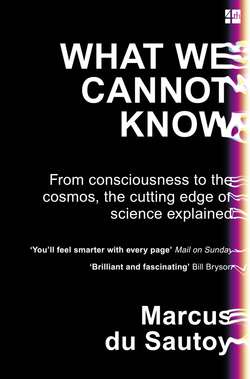Читать книгу What We Cannot Know: Explorations at the Edge of Knowledge - Marcus Sautoy du - Страница 41
3
ОглавлениеEveryone takes the limits of his own vision for the limits of the world.
Arthur Schopenhauer
When I started at my comprehensive school, I remember my music teacher asking the class if there was anyone who wanted to learn a musical instrument. Three of us put up our hands. The teacher led us into the storeroom cupboard to see what instruments were available. The cupboard was bare except for three trumpets stacked up on top of each other.
‘It looks like you’re learning the trumpet.’
I don’t regret the choice (even if there wasn’t one). I had a great time playing in the local town band and larking around in the brass section of the county orchestra as we counted bars rest. But I used to look over with a little envy at the strings who seemed to be playing all the time, getting all the good tunes. A few years ago, during a radio interview, I was asked what new musical instrument I would choose to learn, given the opportunity, and which piece of music I would aspire to play.
‘The cello. Bach’s suites.’
The question has been nagging at the back of my mind since that interview: could I learn to play those beautiful cello suites? Perhaps it was too late to pick up such new skills, but I needed to know. So I bought a cello.
It sits behind me as I write about trying to predict the outcome of the dice. When I need a break from analysing the equations that control the fall of the red cube on my desk, I massacre one of the gigues from the first suite for cello. I can feel Bach turning in his grave but I am enjoying myself.
One of the fun things about the cello is the possibility of sliding your finger up the string to create a continuous glissando of notes. Not something I can do on my trumpet, which is an instrument of discrete notes corresponding to the different combinations of fingers I put down. It turns out that this tension between the continuous glissando of the cello and the discrete notes of the trumpet is relevant to my attempts to predict the behaviour of my dice.
